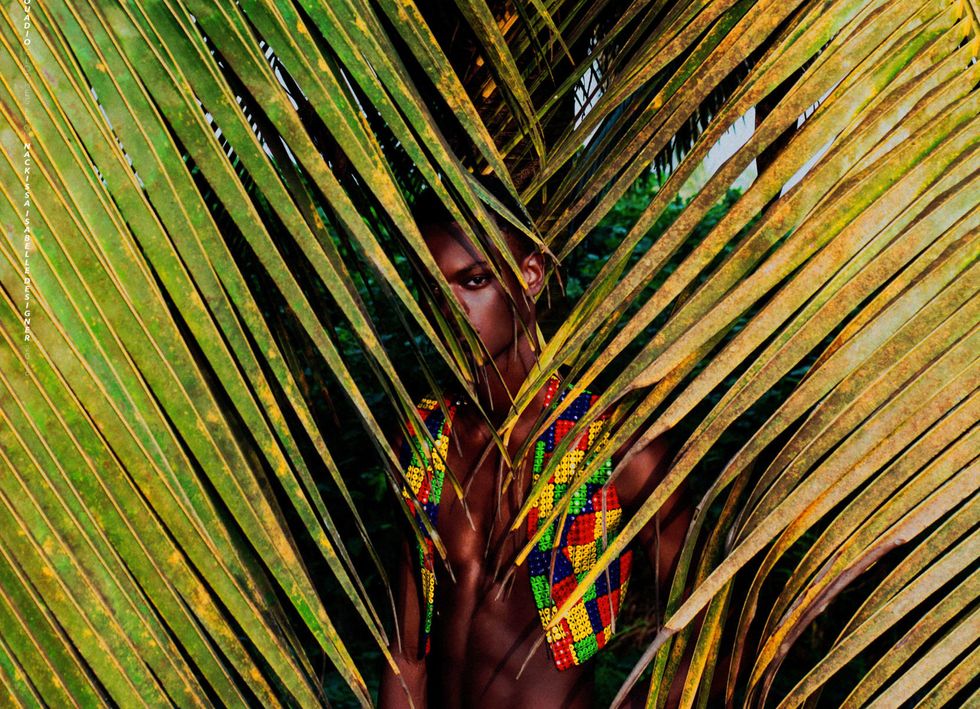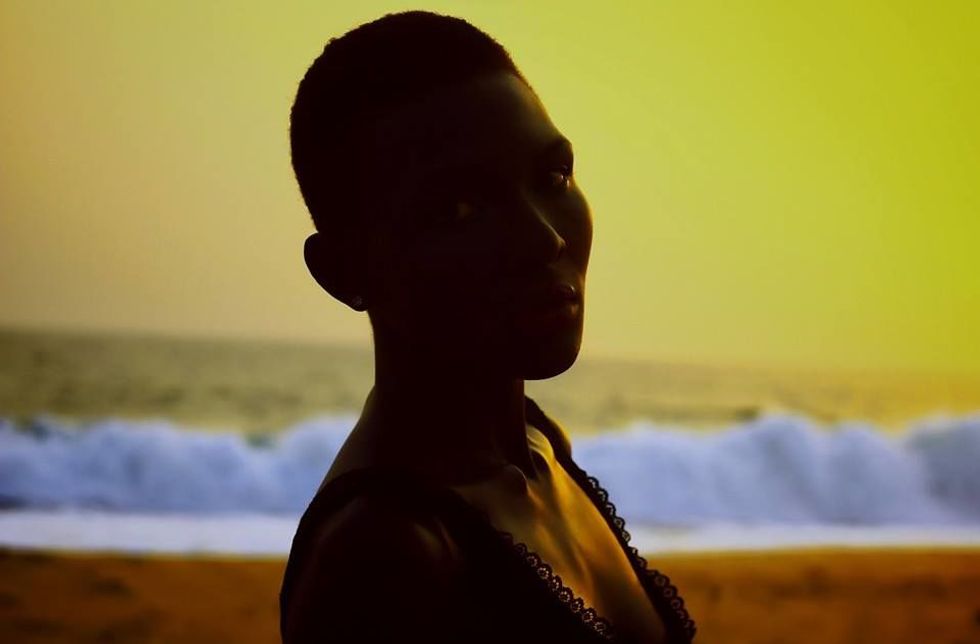Meet Ivorian Fashion Photographer Dadi—the Leading Voice of Young Abidjan Creatives
We catch up with Côte d’Ivoire's Kouamé Aka Aboubakhr Thierry, also known as Dadi, on his photography work.

I was already familiar with his work when I first met Ivorian photographer Dadi at a café in Abidjan last year over a Castel beer and a Fine Duo cigarette, his favorite. His use of vibrant colors and strong emotions struck me for their sensuality and had me longing for a universe based on earnest love of people and nature. When I met him, he was soft spoken and incredibly kind, and we became good friends.
The 23-year-old artist, who was born, Kouamé Aka Aboubakhr Thierry in Abidjan, goes by the Instagram handle @nuits_balneaires, or “seaside nights” in English. He is a leading voice among a generation of young Abidjan creatives that are crafting careful, beautiful images of the fast-growing city for both themselves and for a global audience. I got the chance to speak to him about his work for OkayAfrica after he finished a day of shooting.
OkayAfrica: Where did you get the name "Dadi?"
Dadi: Dadi is the name of my grandfather. I have my grandfather’s name, which is Aka. And my mother always called me Dadi, like Daddy in English. In Ivory Coast, we often give the name of the grandparents to the newborn child.
How did you get into photography?
I’ve been doing photography for 4-5 years now, and it’s been a natural process. My mother came back from a trip with a small camera four years ago. It was a period where there was more and more interest in photography here. At the time, I didn’t really know much about photography as art. It was in this moment that I discovered that you can do beautiful things with a camera. I’ve always had an interest in art and aesthetics, especially. But not for a specific area, and it was then that I discovered photography, and advanced step by step.
I started by photographing friends. After that, I tried objects of nature, landscapes, stuff like that. But I have always been fascinated with people, and photographing people, as well as a strong taste for aesthetics.
I love sensuality, forms of faces, lines, bone structure. I don’t know how to describe it. I’ve never put a name on what exactly I like. But I love capturing emotions, everything that I sensitive and sensual. I ended up doing fashion photography because I loved everything that goes into the relationship between people and their clothing. I love the contact between a person and what they wear. You can play a lot with it.
Why Nuits Balnéaires?
Nuits Balnéaires is me, it’s my aesthetic, it’s my world. The night and the sea, these two things are magical, and they are the two principal elements of my work. For me, the night is when I am most inspired, more creative, when I am most at ease. The night is beautiful: I love the darkness, I love the bright neons of street signs. And after all, it is only at full moon when werewolves come out. I also love the sea, the water, and I feel whole when I’m in contact with the sea. I feel better, at 100 percent of myself.

Did you go to the sea a lot growing up?
When I was little, yes. But I didn’t go in the water that much because my father didn’t want me to. My father was scared. But I learned to swim by myself, I was nine and I hid myself to go to the pool. I didn’t take any courses.
Abidjan is a city on a lagoon and Nuits Balnéaires is all about Abidjan. I would describe Nuits Balnéaires as coastal. It’s the vibe of the West African coast, the Gulf of Guinea, the beaches at Bassam, Assinie, Sao Tome et Principe, it’s this vibe: very tropical, the sunsets, the storms on the sea. It’s a world that fascinates me.
What's your relationship between Abidjan and your work?
Everything about Abidjan inspires me. I love my neighborhood, Vallon, the Plateau and its high-rises. At sunset in the Plateau, the bats migrate and it creates a very distinctive atmosphere. Abidjan is somber and jovial at the same time.
Abidjan is full of vice. There is a bit of history of violence because of the war, but it can never go very far because Abidjan is a city where at the end of the day, people love each other. Ivorian people, with all their differences, are very tightly knit. In every family you have people who come from the north, the south, east, west, we’re all mixed. And that means that despite all the fighting we can never take it very far in the end.
What is the fashion scene like in Abidjan?
It’s progressing. We have brands like Loza Malhéombo and Awalé Studio and Super Yaya, which are all brands that I love and that inspire me. But In Abidjan I feel like there is more interest in style than in individual brands or designers. Fashion is reserved more for the upper class and is still a relatively small community. On the other hand, everybody has style.
What I like about Abidjan is that we don’t follow trends. Everyone has their own style based on their emotions, their temperament, their personality, and there are a lot of different cultures that influence us.
What are your favorite colors?
I love white, blue, and black. I like pastel colors, the colors of flesh, khaki, maroon. I love nature, so green as well, and palm trees, coconuts, the warm colors of 5:00 p.m. right before sunset and things that remind me of the tropics, of seaside nights. That’s my aesthetic.
[oka-gallery]
Lots of images you take of yourself are of you looking away from the camera, while images you take of other models are straight on. Why is that and what is the difference between the two?
I’ll be frank: I’m not super at ease with my physique, and I’m not fully comfortable with myself. I’m very timid, very introverted. I’m not at ease with putting myself in the spotlight, either. There’s a bit of discomfort and a lack of self-confidence. But I love taking photos of people directly in their eyes. It’s beautiful to see people looking fully present. Most of the models I photograph are full of confidence and love the camera, and I take a lot of joy photographing them face on. I love everything related to the body.
What photographers inspire you?
Everything I see inspires me. I’m not going to tell you names of famous photographers because they don’t inspire more or less than photographers like you, or other people posting stuff that I see in my Instagram feed every day. I’m inspired by everybody and don’t have a preference for a photographer. But I do love minimalism and things that focus on detail, on the important information.
Which cities do you want to visit?
Berlin. I would love to photograph fashion, but also vice in Berlin (laughs) and New York for its diversity. Berlin is very avant-garde and that’s what I want to see. Berlin to me seems to be a city with very few complexes, one that is very free, and doesn’t follow the rules.

